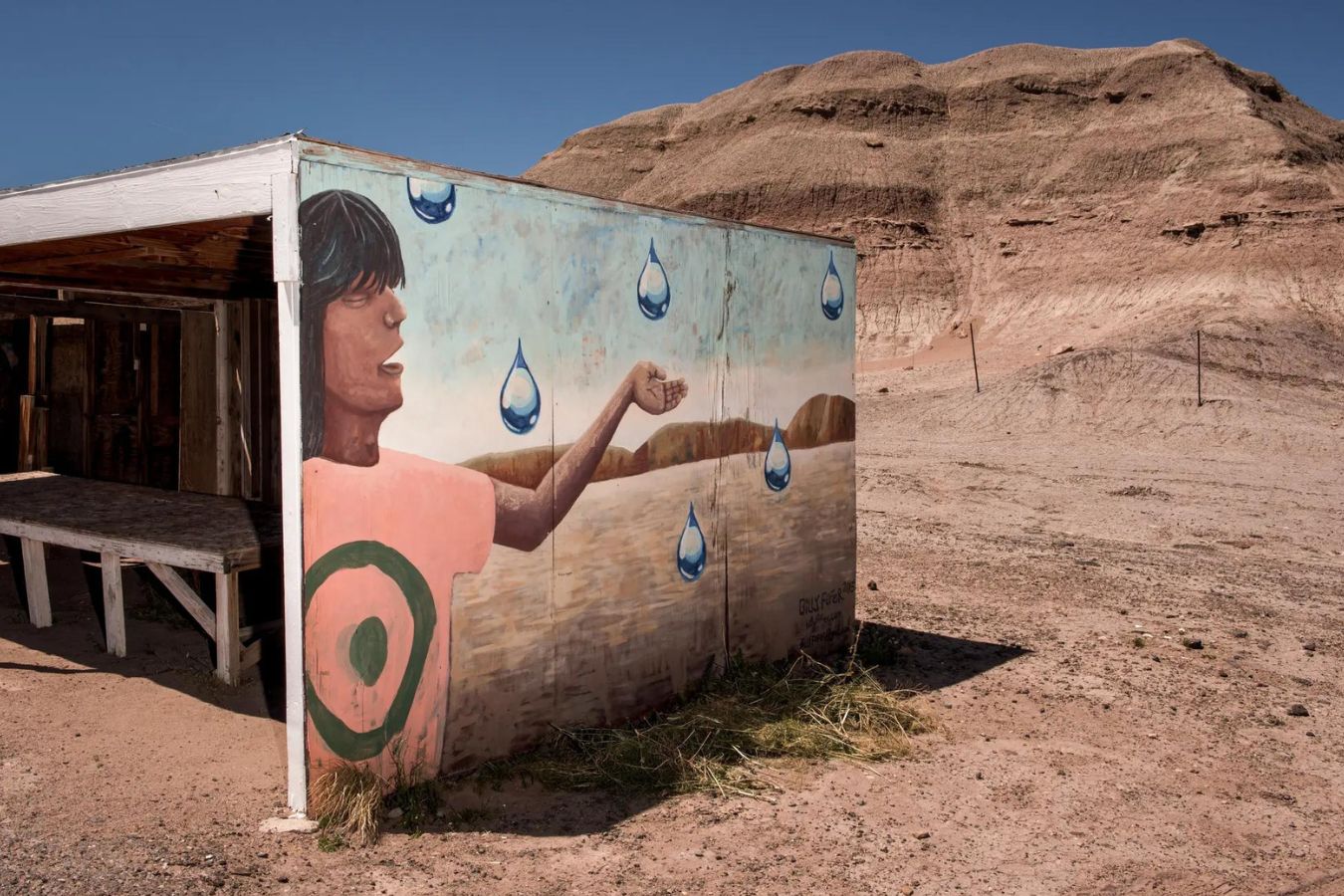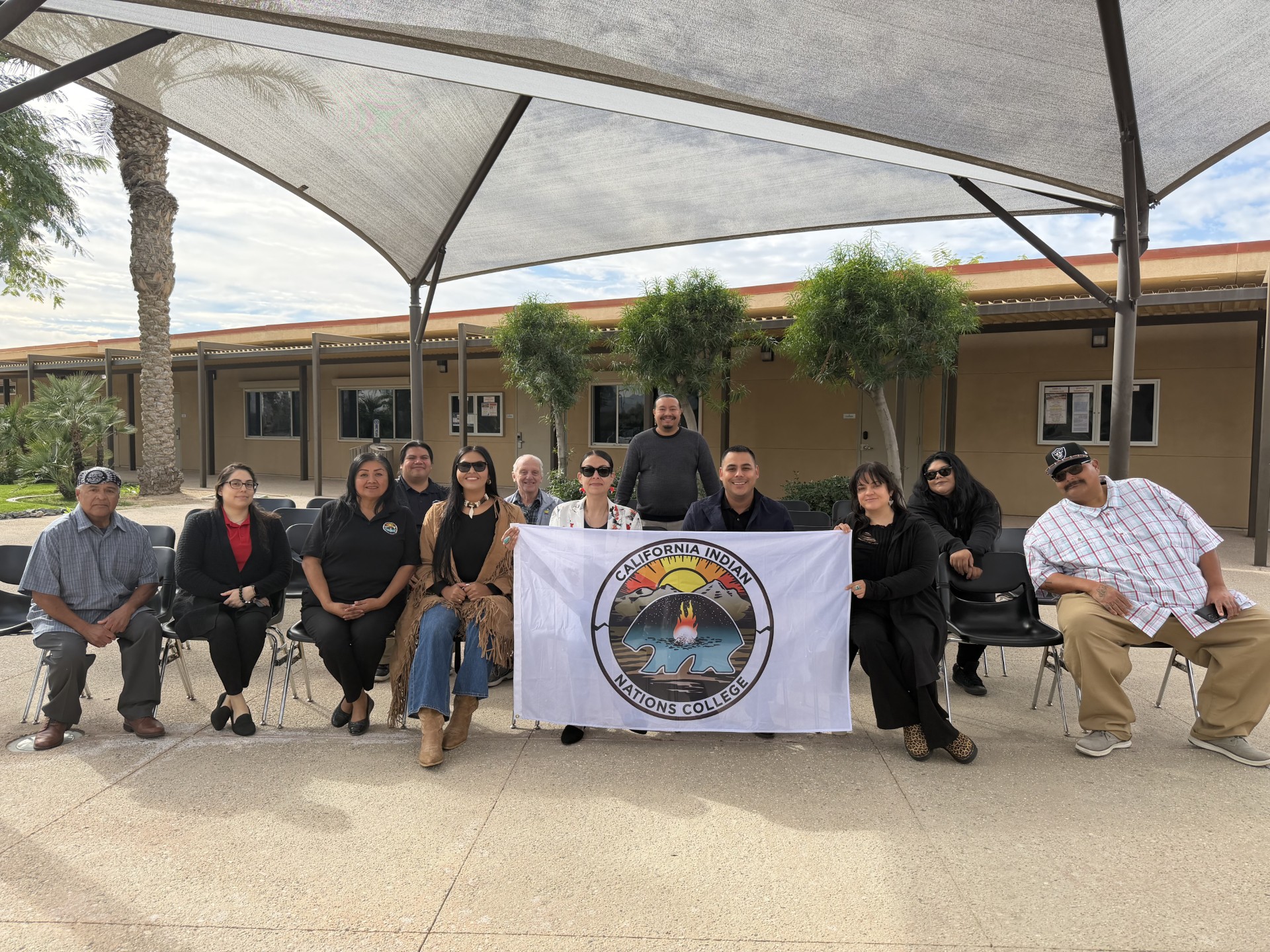
- Details
- By Mark Olalde and Umar Farooq, ProPublica, and Anna V. Smith, High Country News
The Dilkon Medical Center, a sprawling, $128 million facility on the Navajo Nation in Arizona, was completed a year ago.
This story was originally published by ProPublica.
With an emergency room, pharmacy and housing for more than 100 staff members, the new hospital was cause for celebration in a community that has to travel long distances for all but the most basic health care.
But there hasn’t been enough clean water to fill a large tank that stands nearby, so the hospital sits empty.
The Navajo Nation has for years been locked in contentious negotiations with the state of Arizona over water. With the tribe’s claims not yet settled, the water sources it can access are limited.
The hospital tried tapping an aquifer, but the water was too salty to use. If it could reach an agreement with the state, the tribe would have other options, perhaps even the nearby Little Colorado River. But instead, the Dilkon Medical Center’s grand opening has been postponed, and its doors remain closed.
For the people of the Navajo Nation, the fight for water rights has real implications. Pipelines, wells and water tanks for communities, farms and businesses are delayed or never built.
ProPublica and High Country News reviewed every water rights settlement in the Colorado River Basin and interviewed presidents, water managers, attorneys and other officials from 20 of the 30 federally recognized basin tribes. This analysis found that Arizona, in negotiating those water settlements, is unique for the lengths it goes to extract concessions that could delay tribes’ access to more reliable sources of water and limit their economic development. The federal government has rebuked Arizona’s approach, and the architects of the state’s process acknowledge it takes too long.
The Navajo Nation has negotiated with all three states where it has land — Arizona, New Mexico and Utah — and has completed water settlements with two of them. “We’re partners in those states, New Mexico and Utah,” said Jason John, the director of the Navajo Nation Department of Water Resources, “but when it comes to Arizona, it seems like we have different agendas.”
The U.S. Supreme Court ruled in 1908 that tribes with reservations have a right to water, and most should have priority in times of shortage. But to quantify the amount and actually get that water, they must either go to court or negotiate with the state where their lands are located, the federal government and competing water users. If a tribe successfully completes the process, it stands to unlock large quantities of water and millions of dollars for pipelines, canals and other infrastructure to move that water.
But in the drought-stricken Colorado River Basin, whatever river water a tribe wins through this process comes from the state’s allocation. (The basin includes seven states, two countries and 30 federally recognized tribes between Wyoming and Mexico.) As a result, states use these negotiations to defend their share of a scarce resource. “The state perceives any strengthening of tribal sovereignty within the state boundaries as a threat to their own jurisdiction and governing authority,” said Torivio Fodder, manager of the University of Arizona’s Indigenous Governance Program and a citizen of Taos Pueblo.
While the process can be contentious anywhere, the large number of tribes in Arizona amplifies tensions: There are 22 federally recognized tribes in the state, and 10 of them have some yet-unsettled claims to water.
The state — through its water department, courts and elected officials — has repeatedly used the negotiation process to try to force tribes to accept concessions unrelated to water, including a recent attempt to make the state’s approval or renewal of casino licenses contingent on water deals. In these negotiations, which often happen in secret, tribes also must agree to a state policy that precludes them from easily expanding their reservations. And hanging over the talks, should they fail, is an even worse option: navigating the state’s court system, where tribes have been mired in some of the longest-running cases in the country.
Arizona creates “additional hurdles” to settling tribes’ water claims that don’t exist in other states, said Anne Castle, the former assistant secretary for water and science at the U.S. Department of the Interior. “The tribes haven’t been able to get to settlement in some cases because Arizona would impose conditions that they find completely unacceptable,” she said.
Neither Gov. Doug Ducey, a Republican who left office in January after two terms, nor his successor, Democratic Gov. Katie Hobbs, responded to requests for comment on the state’s approach to water rights negotiations. The Arizona Department of Water Resources, which represents the state in tribal water issues, declined to answer a detailed list of questions.
Shirley Wesaw, a citizen of the Navajo Nation, lives near the yet-to-open Dilkon Medical Center. She eagerly watched as it was built, anticipating a time when her elderly parents would no longer have to spend hours in the car to see their doctors off the reservation after it was completed in June 2022. But Wesaw is familiar with the difficulty accessing water in the area. Shared wells are becoming less reliable, she said. It’s most difficult during the summer, when some of her relatives have to wake up as early as 2 a.m. to ensure there’s still water to draw from a community well.
“When it’s low, there’s a long line there,” Wesaw said, “and sometimes it runs out before you get your turn to fill up your barrels.”
Pipe Dream
One impact of Arizona’s negotiating strategy was particularly evident at the outset of the pandemic.
In May 2020, as the Navajo Nation faced the highest COVID-19 infection rate in the country, the tribe’s leaders suspected that their limited clean water supply was contributing to the virus’ spread on the reservation. They sent a plea for help to Ducey, the governor at the time.
More than a decade earlier, as the tribe was negotiating its water rights with New Mexico, Arizona officials inserted into federal legislation language blocking the tribe from bringing its New Mexico water into Arizona until it also reaches a settlement with Arizona. John, with the tribe’s water department, said the state “politically maneuvered” to force the tribe to accept its demands.
 Screenshot 2023 06 15 at 7.36.48 PMThe Navajo-Gallup Water Supply Project pipeline east of Window Rock, Arizona. (Photo: Sharon Chischilly for ProPublica and High Country News)
Screenshot 2023 06 15 at 7.36.48 PMThe Navajo-Gallup Water Supply Project pipeline east of Window Rock, Arizona. (Photo: Sharon Chischilly for ProPublica and High Country News)
A multibillion-dollar pipeline that the federal government is building will connect the Navajo Nation’s capital of Window Rock, Arizona, to water from the San Juan River in New Mexico. But without a settlement in Arizona, the pipe can’t legally carry the water. The restriction left the tribe waiting for new sources of water, which, during the pandemic, made it difficult for people to wash hands in communities where homes lacked indoor plumbing.
“For the State of Arizona to limit the access of its citizens to drinking water is unconscionable, especially in the face of the coronavirus pandemic,” then-Navajo President Jonathan Nez and Vice President Myron Lizer wrote to the governor. Nez and Lizer included with their letter a proposed amendment that would change a single sentence in the law. They asked Ducey to help persuade Congress to pass that amendment, allowing enough water for tens of thousands of Diné residents to flow onto the reservation.
Arizona rejected the request, according to multiple former Navajo Nation officials.
The Department of Water Resources did not provide ProPublica and High Country News with public records related to the state’s denial of the Navajo Nation’s request for help getting its water to Window Rock. Hobbs’ office said it could not find the communications relating to the incident.
Land and Water
Nearly half of the tribes in Arizona are deadlocked with the state over water rights.
The Pascua Yaqui Tribe has 22,000 enrolled members, but limited land and housing allow only a third to live on its 3.5-square-mile reservation on the outskirts of Tucson. A subdivision still under construction has just started to welcome some Pascua Yaqui families to live on the reservation. But the new development isn’t nearly enough to house the more than 1,000 members on a waiting list. More than 18,000 additional acres of land would be needed to accommodate the tribe’s future population, according to a 2021 study it commissioned.
But Arizona has used water negotiations with tribes to curtail the expansion of reservations in a way no other state has.
It’s state policy that, as a condition of reaching a water settlement, tribes agree to not pursue the main method of expanding their reservations. That process, called taking land into trust, is administered by the Bureau of Indian Affairs and results in the United States taking ownership of the land for the benefit of tribes. Alternatively, tribes can get approval from Congress to take land into trust, but that process can be more fraught, requiring expensive lobbying and travel to Washington, D.C.
The policy will force the Pascua Yaqui “to choose between houses for our families and water certainty for our Tribe and our neighbors,” then-Chairman Robert Valencia wrote to the Department of Water Resources in 2020. “While we understand that our Tribe must make real compromises as part of settlement, this sort of toll for settlement that is unrelated to water is unreasonable and harmful.”
For tribes across Arizona and the region, building homes and expanding economic opportunities to allow their members to move to reservations is a top priority.
The Pueblo of Zuni was the first tribe to agree to Arizona’s land requirement when it settled its water rights with the state in 2003. The Zuni had hoped to take into trust more land they own near their most sacred sites in eastern Arizona, but that will now require an act of Congress. Since the Zuni settlement, all four tribes that have settled water rights claims with Arizona have been required to agree to the same limit on expansion, according to ProPublica and High Country News’ review of every completed settlement in the state.
In a 2020 letter, the Navajo Nation’s then-attorney general called the state’s opposition to expansion “an invasion of the Nation’s sovereign authority over its lands and so abhorrent as to render the settlement untenable.”
The Department of the Interior, which negotiates alongside tribes, has agreed, objecting on multiple occasions in statements to Congress to Arizona’s use of water negotiations to limit the expansion of reservations. In 2022, as the Hualapai Indian Tribe settled its rights, the department called the state’s policy “contrary to this Administration’s strong support for returning ancestral lands to Tribes.”
Tom Buschatzke, director of the state’s Department of Water Resources, explained the reasoning behind Arizona’s stance to state lawmakers, noting it’s based on Arizona’s interpretation of a century-old federal law that Congress is the only legal avenue for tribes to take land into trust. “The idea of having that tribe go back to Congress is so that there’s transparency in a hearing in front of Congress so the folks in Arizona who might have concerns can get up and express those concerns and then Congress can act accordingly,” he told the Legislature, adding that the Bureau of Indian Affairs’ process, meanwhile, puts the decision in “the hands of a bureaucrat in Washington, D.C.”
The state water department has even gone outside water rights negotiations to challenge reservation expansion without an act of Congress. When the Yavapai-Apache Nation filed a trust land application with the Bureau of Indian Affairs in 2001, the Department of Water Resources fought it, according to documents obtained via a public records request. The department went on to argue in an appeal that the trust land transfer would infringe on other parties’ water rights. A federal appellate board eventually ruled in favor of the tribe, but the state’s opposition contributed to a five-year delay in completing the land transition.
Pascua Yaqui Chairman Peter Yucupicio has watched non-Indigenous communities grow as he works to secure land and water for his tribe. “They put the tribes through the wringer,” he said.
Arizona’s Demands
No one has defined the terms of water negotiations between Arizona and tribes more than former U.S. Sen. Jon Kyl.
Before entering politics, he was a long-time attorney for the Salt River Project, a water and electric utility serving parts of metro Phoenix. During that time, he lobbied for and consulted on state rules that force tribes to litigate water disputes in state court if they’re unable to reach a settlement. After landing in the Senate, Kyl and his office oversaw meetings where parties hashed out disputes, and he viewed his role as that of a mediator. He helped negotiate or pass legislation for the water rights of at least seven tribes.
“I wasn’t taking a side,” Kyl told ProPublica and High Country News, “but I was interested in seeing if they could all reach agreements.”
Help us defend tribal sovereignty.
At Native News Online, our mission is rooted in telling the stories that strengthen sovereignty and uplift Indigenous voices — not just at year’s end, but every single day.
Because of your generosity last year, we were able to keep our reporters on the ground in tribal communities, at national gatherings and in the halls of Congress — covering the issues that matter most to Indian Country: sovereignty, culture, education, health and economic opportunity.
That support sustained us through a tough year in 2025. Now, as we look to the year ahead, we need your help right now to ensure warrior journalism remains strong — reporting that defends tribal sovereignty, amplifies Native truth, and holds power accountable.
 The stakes couldn't be higher. Your support keeps Native voices heard, Native stories told and Native sovereignty defended.
The stakes couldn't be higher. Your support keeps Native voices heard, Native stories told and Native sovereignty defended.
Stand with Warrior Journalism today.
Levi Rickert (Potawatomi), Editor & Publisher






